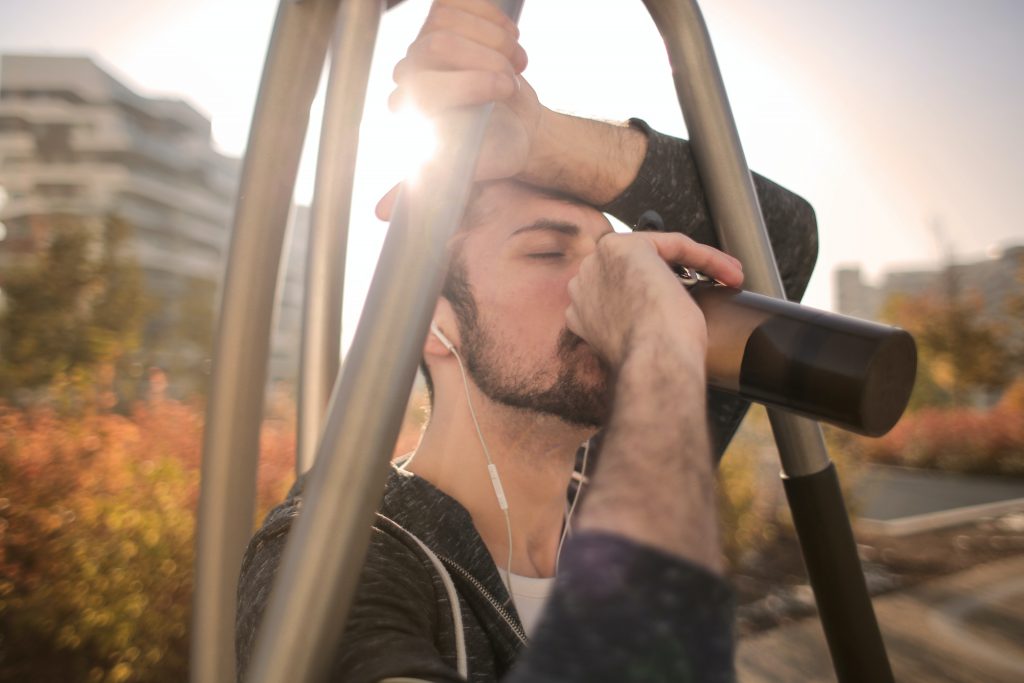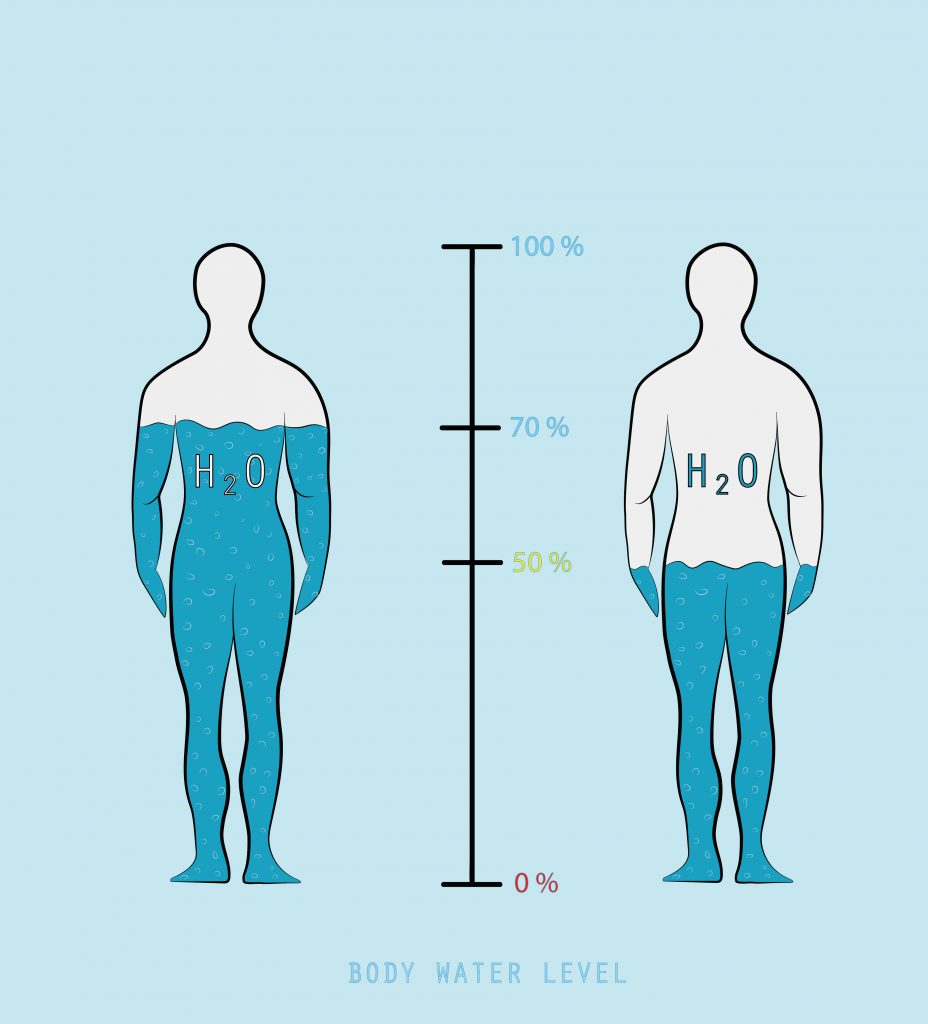
Believe it or not, 75% of your body is made up of water. From cells to the major organs of the body, each needs water to maintain its optimal functions. This is why staying hydrated is an essential component of a healthy body.
Releasing water from your body is normal. Each time you move, breathe, sweat, urinate and defecate, you expel fluids in your body. But when you start to lose more than 10% to 15% of the water in your body, that’s when you begin to feel symptoms like nausea, vomiting, headaches, and even vertigo. In fact, dehydration and vertigo have been found to correlate among patients with vertigo.
With that said, it’s vital that you know the signs of dehydration so you can prevent them at the onset.
What Is Dehydration
Dehydration occurs when your body loses more water than you drink. Losing water may cause the functioning of your organs, muscles, and tissues to fail. That’s because the imbalance disrupts the usual salt and sugar levels in your blood, interfering with how your body functions.
What Causes Dehydration
Essentially, not drinking enough fluids and losing too much water in your system are the overarching causes of dehydration. However, some activities or health conditions may also cause your body to get dehydrated even when you get enough fluids.
- Perspiration
Sweating is the body’s natural way of cooling itself whenever you feel hot. When you sweat, your body releases a significant amount of water. If you don’t replenish lost fluids in the body, you run the risk of developing dehydration.
- Illness
Some illnesses that cause diarrhea and vomiting may also result in dehydration. Diarrhea and vomiting may cause your body to expel more water than it should. When this happens, you even lose a good number of electrolytes that help maintain the function of your muscles and organ processes.
- Fever
When you’re sick with fever, your body temperature rises. Your body will attempt to lower your temperature by releasing water through your skin to compensate for that change.
- Urination
Besides sweating, peeing is also the body’s natural way to release toxins from your body. However, some chronic diseases like diabetes may lead to frequent urination, which then results in dehydration. Increased urination is also a side effect of certain medications, which may also lead to dehydration.
Common Symptoms Of Dehydration
Symptoms for dehydration vary depending on the mildness or severity of your case.
- For mild to moderate cases, a home remedy may suffice. Here are some of the usual symptoms:
- Feeling thirsty
- Dry mouth
- Fatigue
- Headache
- Nausea
- Lightheadedness
- Feeble muscles
- Decreased urination
- Darker-colored urine
- When left unchecked, mild dehydration could easily lead to severe dehydration, which would require hospitalization. Severe dehydration symptoms include:
- Lack of sweat
- Sunken eyes
- Low blood pressure
- Increased heart rate
- Dry and shriveled skin
- Unconsciousness
- Dark Urine
- Symptoms for dehydration may also vary by age. Dehydration among children or infants is also common since babies can’t necessarily communicate their concerns. For this reason, you need to be familiar with the signs of dehydration among children.
- Dry mouth and tongue
- No wet diapers for three or more hours
- Recessed fontanel (soft spot on top of a baby’s head)
- Sunken eyes and cheeks
- Tearless cries

Preventing Dehydration
Prevention is always better than cure. In order to prevent yourself from getting dehydrated, the best thing you can do is increase the amount and frequency of your water intake. In particular, in instances where your body will have a tough time holding water down, consider these preventive measures:
- When experiencing diarrhea or vomiting, oral rehydration solution and drinking lots of water can help maintain fluid levels and replenish electrolytes in your body.
- Not getting enough fluids can also have adverse effects on your brain. That makes sense because your brain is actually composed of more than 70% water. If you experience confusion, dizziness, or lightheadedness, rehydrate yourself properly by eating water-filled foods. Water-rich foods you can try include grapes, apples, strawberries, tomatoes, watermelon, and cucumbers. They’ll help replenish the body with the electrolytes and minerals that your brain and tissues need to absorb.
- Hydrate yourself before engaging in strenuous physical exercise. During your workout, make sure you’re replenishing lost fluids in between sets. This will help prepare your muscles for any strenuous activity and promote better regeneration, making them more toned and ready for your next exercise session.
- The weather may also affect the way your body gets rid of fluids. During hot and humid climates, make sure to up your fluid intake to avoid getting dehydrated. In colder months, you may still suffer from dehydration as the moisture in the air dries.
- Another way to prevent dehydration is to avoid sugary beverages like sports drinks as much as possible. Your body doesn’t need extra sugars. In fact, higher-than-normal sugar levels in the body can trigger hyperglycemia. It’s a condition that causes an increase in urination as your body’s way to get rid of excess sugar. Increased urination, of course, leads to dehydration. It’s the same reason people suffering from diabetes commonly experience polyuria or the increased urge to urinate.
- Drinking a glass or two of fluid first thing in the morning is also an effective way of preventing dehydration. That’s because the human body loses fluids during sleep. You’ll need to rehydrate by the next morning, even if you’ve gone to bed well-hydrated. And if you’re really after hydration using this method, you can try milk instead of plain water. Why? A study pointed out that macronutrients and electrolytes actually play a role in helping your body absorb and retain the fluid you take in, especially on an empty stomach in the morning.
Water Alternatives To Help You Rehydrate
Besides water, there are many alternatives you can drink or even eat to stay hydrated. Drinking flavorless water could be such a chore at times. You can make drinking fluids more exciting by switching it up with these alternatives:
- Sparkling Water
- Milk
- Coconut Water
- Detox Water
- Fruit Juice
- Water Enhancers
- Fruits And Vegetables
Takeaway
Dehydration is the result of too much water loss in your system. When this happens, you may not perform your best since your body needs a certain amount of water to function correctly. If left untreated, dehydration could lead to more severe complications and hospitalization. The best way to counter dehydration is to frequently drink a glass of water or other hydrating water alternatives.
Read More
3 Tips to Keep Your Skin and Hair Hydrated This Winter
How You Can Prepare Your Body For Your Workout
Health Coach Allison Hagendorf on Men’s Health, Fitness, and the Shortest Route to Getting it
10 Fitness Hacks Every Fit Junkie Should Know
Katelyn Runck on Health, Fitness, and Embracing Your Potential
Feature Photo by Andrea Piacquadio